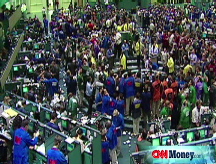Oil touches record but ends lower
Gasoline prices also reach all-time high with Mideast tensions, weak dollar in the background.
NEW YORK (CNNMoney.com) -- Retail gas prices and crude oil futures reached record highs Monday amid a backdrop of Mideast tensions and dollar concerns, but crude ended the day lower.
The national average price for a gallon of gasoline climbed to $4.086, according to a daily survey by motorist group AAA. That was up 0.7 cent from $4.079 the previous day, and eclipsed the previous mark of $4.08 set June 16.
Gas prices have risen 2.9% in the last month and are almost 38% higher than where they were a year ago.
Meanwhile light, sweet crude for August delivery settled down 21 cents at $140 a barrel after earlier setting a trading record of $143.67 a barrel, 50% above the price at the end of 2007.
Despite the pullback, oil prices remain consistently over $140 a barrel.
Equal bets "You've got the same number of people betting that this market will go down this summer as are betting that it will go up," said independent NYMEX trader Anthony Grisanti in a video interview with CNNMoney.com. See video
However, Grisanti warned that the future rate of consumption from developing nations such as China, India and the former Soviet Union will outstrip supply.
"My thoughts are the market just goes higher from here... There's nothing on the horizon that's going to turn this thing around," he said.
The high price of crude oil, the primary ingredient in petroleum-based fuels such as gasoline and diesel, drives up costs for consumers and squeezes profit margins for refiners.
Supply concerns Oil prices Monday were driven by threats of overseas supply disruptions and fears of a continued decline in the dollar.
Over the weekend, a report published in The New Yorker said that Congress had authorized $400 million for commando operations in Iran. Iran's Revolutionary Guards issued a statement saying it would bombard Israel if the country were attacked and move to cut off the Strait of Hormuz one of the main oil passageways in the Persian Gulf.
Iran, a member of the Organization of Petroleum Exporting Countries, is also world's fourth-largest oil producer. About 60% of the world's oil passes through the Strait of Hormuz, which is just south of Iran and flows into the Arabian Sea.
The oil market is still feeling the after effects of Libya's surprise threat last week to reduce production in response to a bill being debated in Congress that would allow lawsuits against OPEC nations.
"It's infighting within OPEC," said Tom Orr, head of research with Weeden & Co. in Connecticut.
Saudi Arabia's decision to boost production to 9.7 million barrels a day went against the wishes of other OPEC members such as Venezuela and Iran, which threatens consistent supply levels, said Orr.
"The market is too tight. It doesn't have any wiggle room," he said.
Added to the mix was Nigerian newspaper The Guardian, which reported that militants attacked a houseboat near an oil pumping station operated by Royal Dutch Shell (RDS) in oil-rich Nigeria on Saturday, killing an oil worker.
Possible ECB rate hike Prices were also driven by fears of continued decline in the dollar.
"Dollar weakness is the big elephant in the room... Oil is being bought as a safe-haven commodity over what the dollar is going to be worth," said Phil Flynn, senior market analyst with Alaron Trading in Chicago.
Many analysts believe the European Central Bank, which controls the value of the euro, may raise interest rates when it meets on Thursday, to stave off euro inflation.
An ECB interbank lending interest rate increase would have the same weakening effect on the dollar as a Federal Reserve rate decrease. Crude oil futures are traded in dollars, so a devalued dollar also makes it more attractive to foreign investors.
There may be a lag before crude oil price fluctuations influence gasoline prices at the pump.
$4-a-gallon gas The AAA survey showed that 33 states and the District of Columbia have an average gas price above $4 a gallon.
Alaska has replaced California as the state with the highest gas prices. Drivers in Alaska pay an average of $4.623 for a gallon of gas. Californians pay $4.583 on average for a gallon, and Hawaiians pay $4.408.
The state with the lowest gas price is Missouri, where a gallon of gas averages $3.862.
Diesel prices slipped to $4.762 a gallon from $4.764 the day before.
According to a survey from Consumer Reports last week, 77% of Americans blame the government for high gas prices, compared with 75% who blame oil companies and 70% who blame foreign oil producers.
Surging gas prices have prompted many drivers to change their habits. Nearly 31% said in the Consumer Reports survey that they now walk or ride bicycles more. And 16% said they were riding public transportation more often.
Last week, AAA reported that it expects the number of Americans traveling during the Fourth of July holiday travel period to decline 1.3% to 40.45 million drivers versus 41 million last year. ![]()





